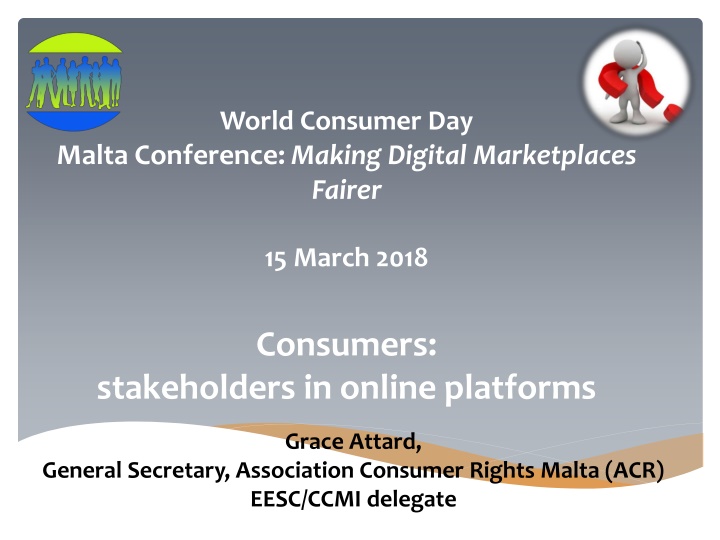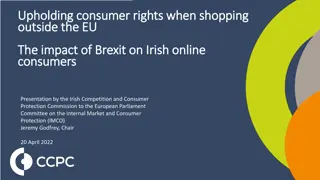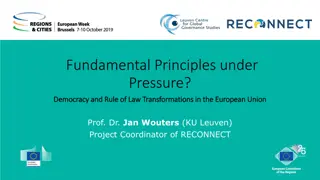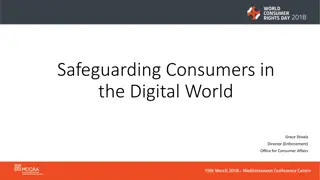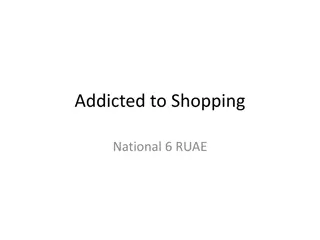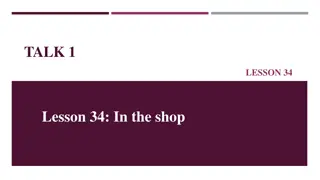Challenges of Online Shopping for European Consumers
European consumers face challenges when shopping online, including barriers to cross-border shopping, lack of awareness about rights and potential benefits, and issues with transactions. The Association for Consumer Rights Malta (ACR) works to promote consumer protection and empowerment in the digital marketplace.
Download Presentation

Please find below an Image/Link to download the presentation.
The content on the website is provided AS IS for your information and personal use only. It may not be sold, licensed, or shared on other websites without obtaining consent from the author.If you encounter any issues during the download, it is possible that the publisher has removed the file from their server.
You are allowed to download the files provided on this website for personal or commercial use, subject to the condition that they are used lawfully. All files are the property of their respective owners.
The content on the website is provided AS IS for your information and personal use only. It may not be sold, licensed, or shared on other websites without obtaining consent from the author.
E N D
Presentation Transcript
World Consumer Day Malta Conference: Making Digital Marketplaces Fairer 15 March 2018 Consumers: stakeholders in online platforms Grace Attard, General Secretary, Association Consumer Rights Malta (ACR) EESC/CCMI delegate
The Association for Consumer Rights MALTA (ACR) ACR promotes: consumer protection and empowerment assists consumers in their queries and complaints educates the general public through interactive information talks, information fact sheets and email press releases Website www.acrmalta.com Facebook profile ACR Malta ACR works closely with MCA, MCCAA - Information and Education Directorate, ANEC, ECC ACR is represented on MEUSAC, ECCG and AGE Platform ACR General Secretary represents consumers on the EESC/CCMI as a delegate for consumer interests ACR is also listed on The Transparency Register
Background: European consumers are now living in a digital age. During the last decade the internet revolutionised the way that consumers interact with businesses, and with one another. An increasing number of transactions are made online Consumers are able to conduct independent research, and share information and experiences, This has shifted the balance of power between retailers and their customers Customers have more choice and control than ever before.
Online shopping 1/2 The European Commission has implemented several key pieces of legislation during recent years in a bid to create a Digital Single Market and encourage cross-border trade The European Consumer Centres Network (ECC-Net) estimates that consumers could save 11.7 billion per year if they could choose from the fullest possible range of goods and services from across the EU s 28 countries when shopping online .
Online shopping 2/2 However, according to an ANEC survey of 4,135 European consumers, only 10% regularly shop online from other EU countries, compared to 63.4% who regularly shop online in their home country (2016). The findings also indicate that significant barriers to cross- border online shopping still exist.
Online shopping challenges 1/2 Respondents who have never shopped cross-border are deterred by a lack of awareness about: which sites to use; the potential benefits; and their rights as EU consumers. For those who have shopped cross-border, 15.2% have experienced problems with a transaction. The reports of MCA on the complaints and enquiries received during the first and last six months of 2017 have also revealed similar problems
Online shopping challenges 2/2 Despite European directives, consumers still face difficulties placing orders with retailers in other EU countries, such as refusal to deliver, unfair variations in prices and unclear or misleading information
European Commission initiatives on Online platforms 1/2 Following the Communication s communication setting out a strategy for the digital single market (DSM), the Commission is committed to undertake a comprehensive assessment of the role of platforms, including in the sharing economy, and of online intermediaries. The European Commission has also published the results of two Eurobarometer surveys on the use of online platforms by consumers and SMEs. Such platforms include online marketplaces, search engines, payment systems, social media, and video and content- sharing sites.
European Commission initiatives on Online platforms 2/2 The Communication on Online Platforms and the Digital Single Market Opportunities and Challenges for Europe underlines the need to adopt policy and regulatory approaches that respond directly to the challenges, and which are flexible and future-proof. Currently the information from the EU Commission and from other sources is directed more to business and SMEs.
Concerns of consumers The concerns of consumers, need to be more adequately addressed, in particular in the following areas 1. Connectivity and inclusion 2. Information and transparency 3. Ownership and use 4. Security and safety 5. Complaints handling and redress
1. Connectivity and Inclusion Having access to a high quality, affordable internet connection, both mobile and fixed, nationally and internationally, More than ever, internet access providers shall not unjustifiably slow down, block access to, or otherwise discriminate against certain applications or services. Consumers should have access to an affordable, high-quality, high-speed internet connection
2. Information and Transparency Having the right information is important To understand how digital products and services work To make decisions in an environment that consumers can trust. To get easily accessible, clear, concise, meaningful and verifiable information that gives full clarity to people at the right time. To enable consumers to understand the implications of their usage of services and facilitate confident, informed decision-making
2. Information and Transparency Clear and easily understandable information is necessary about products and services, providers, processes Consumer rights should be prominent and readily available. Critical information should be made prominent prior to purchase.
3. Ownership and Use Digital technology has changed the nature of many services and products Connected software is now contained in an increasing number of general consumer products. Problems occur if the software provider changes hands and ends support for the product, or has different data governance processes. The contractual clauses and technology that define the usage of a product or service must be fair legitimate to consumer expectations, with rights to fair use guaranteed. The contractual text must be clear for consumers to understand
4. Security and safety - 1/2 Security must be ensured in all parts of a connected system Vulnerabilities in any given component of the system can potentially compromise the whole system. The complex systems of online platforms provide hackers with more vulnerabilities to exploit and a faster pathway to multiple devices. Cybersecurity Through relevant market surveillance mechanisms the concept of safety legislation should be broadened to reflect new cybersecurity, data security and product/service safety concerns
4. Security and safety - 2/2 Data and identity security measures should, among other things, protect payment details, financial assets and personal identity against fraud or misuse. The business sector should: adopt best practice standards such as security by design and be subject to independent assessments of compliance. In case of security incidents or data breaches, they must be subject to timely and adequate notification obligations, liability and compensation rules, and sanctions in case of neglect.
5. Complaints handling and redress - 1/3 Areas to be addressed Identifying which supplier is responsible for faults or problems Verifying claims for the quality or performance of things that rely on multiple partners in the chain to work. These complexities should not affect consumers right to obtain redress. Rights to redress for products and services should not be less than those available for other forms of commerce.
5. Complaints handling and redress - 2/3 Mechanisms should be accessible, affordable, independent, fair, ensure reliable accountability that is timely and efficient.
5. Complaints handling and redress - 3/3 Internal and online dispute resolution Platforms offering products and services should have strong internal dispute mechanisms that do not impose unreasonable delays or burdens on consumers. Recourse to independent redress should be available to address complaints that are not satisfactorily resolved by internal mechanisms. It should be clear where consumers should go for assistance. Support for consumer dealing with cross-border dispute resolution must be available. Online dispute resolutions should be provided but not to the exclusion of other avenues.
Effective Data Protection Rules 1/2 The new Data Protection rules (GDPR) which will apply across the EU will provide citizens with easier access to their own data; a right to transfer data from one service provider to another for example a bank or mobile provider; a clarified right to be forgotten online; the right to know quickly should their data be hacked.
Effective Data Protection Rules - 2/2 For businesses, especially SMEs, public authorities and all citizens, the EU Commission is preparing practical guidance to ensure the data protection rules are effective on the ground. This will include a practical online toolkit in all EU languages covering key themes and frequently asked questions and should be applicable to Online Platforms. Individuals have a strong right of access to see their personal data Except in particular circumstances (Data Protection Act Section 5)
Digital Education and Awareness 1/2 Education and awareness provisions should complement rather than replace regulatory and legislative protection. Education is a shared responsibility for all public and private actors involved in the ecosystem. Education and awareness should support consumers to developskills and confidence to be able to manage risks and opportunities, to make informed choices, to know how to get assistance and advice and to know how to act to protect and improve their well-beingand identity in a fast developing online usage .
Digital Education and Awareness 2/2 Special training needs to be provided for vulnerable consumers including the elderly and people with different forms of disabilities The need to ensure that low levels of literacy do not result in widening the digital gap Lifelong learning programs for adults of all ages can help reduce the digital gap
Conclusion Companies, regulators, consumer protection bodies and consumer organisations should: collaborate to develop systems make it easier for consumers to understand risks and opportunities of connected products and services It is important that consumers be pro-active rather than seek redress as a result of lack of information provided by the seller. Empowering the consumer remains vital
And what is word knowledge but a shadow of wordless knowledge? Kahlil Gibran The Prophet
Thank you Find us on: www.acrmalta.com Acr Malta
